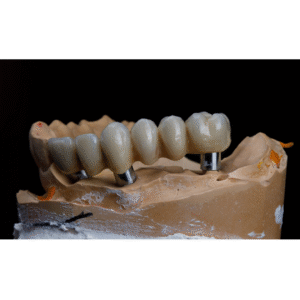Over the last 25 years of my practice, one of the most common questions I hear from patients — both local and international — is
👉 “Doctor, should I go for implants, bridges, or dentures?”
The honest answer is — there isn’t a “one-size-fits-all.” Each of these options has its place, depending on your age, oral condition, medical history, and budget. Let me walk you through the differences in a way that helps you make an informed decision.
Dentures
Dentures are removable false teeth made of acrylic. They can replace a single tooth, multiple teeth, or even a full set.
In my experience, dentures are often ideal for very elderly patients (80+ years) who have significant jawbone loss or medical conditions such as Parkinson’s, cancer, or muscular disorders. They’re also useful as a temporary option while waiting for implants to heal.
✅ Advantages:
- Affordable and time-tested
- Work well as an interim solution
- No surgery required
❌ Challenges:
- Take 2–3 weeks to adapt (speech, chewing)
- Need maintenance and eventual replacement
💰 Cost Abroad: $800–$2,500
💰 Cost in India: ₹15,000 – ₹40,000 ($200–$500)

Dental Bridges
Bridges are fixed solutions that replace 1–5 missing teeth by anchoring onto the healthy teeth next to the gap.
In my clinic, I usually recommend bridges when patients have strong neighboring teeth and want a quicker, non-surgical solution. However, trimming healthy teeth is a drawback we always explain carefully.
✅ Advantages:
- Strong and durable
- Adaptation usually within 24–48 hours
- Faster than implants
❌ Challenges:
- Healthy teeth need trimming
- If not done accurately, food leakage can damage supporting teeth
💰 Cost Abroad: $2,000–$5,000
💰 Cost in India: ₹40,000 – ₹1,20,000 ($500–$1,500)

Dental Implants
In my practice, implants are the gold standard because they don’t rely on neighboring teeth and provide the closest feel to natural teeth. They are especially popular among my international patients from the US, UK, and Australia who want a long-term solution that looks and feels real.
✅ Advantages:
- Longest-lasting (often a lifetime)
- Function and aesthetics are closest to natural teeth
- Do not affect neighboring teeth
❌ Challenges:
- Higher cost
- Not suitable for patients with uncontrolled diabetes, heart/kidney issues
- Requires skilled professionals (always check your dentist’s implant credentials!)
💰 Cost Abroad: $3,000–$7,000 per implant
💰 Cost in India: ₹70,000 – ₹1,20,000 ($800–$1,500 per implant)

Side-by-Side Comparison
| Feature | Dentures | Bridges | Implants |
| Cost in US/UK/AUS/UAE | $800 – $2,500 | $2,000 – $5,000 | $3,000 – $7,000 per tooth |
| Cost in India | ₹15,000 – ₹40,000 ($200–$500) | ₹40,000 – ₹1,20,000 ($500–$1,500) | ₹70,000 – ₹1,20,000 ($800–$1,500) |
| Appointment Wait Time Abroad | 3–6 weeks | 4–6 weeks | 6–12 weeks (consult + planning) |
| Appointment Wait Time in India | 1–3 days | 3–5 days | Consult + surgery in 2–3 days |
| Total Treatment Duration Abroad | 3–6 weeks | 4–8 weeks | 6–12 months |
| Total Treatment Duration in India | 3–5 days | 5–7 days | 7–10 days (immediate loading) or 3–6 months (traditional protocol) |
| Support | Gums & bone | Neighboring teeth | Independent in bone |
| Surgery Needed | ❌ No | ❌ No | ✅ Yes |
| Longevity | 5–7 years | 10–15 years | 25+ years / Lifetime |
🌍 Why International Patients Choose India
Many of my patients from the US, UK, and Australia often tell me they waited months just for an implant consultation back home — and paid up to 5x more.
Here in Bengaluru, India, we’re able to:
- Start treatment within 2–3 days of arrival
- Complete full-mouth implants in 7–10 days (for suitable candidates)
- Offer international-quality care at ISO-certified centers
- Provide up to 70% savings on treatment costs
This is why India has become a global hub for dental tourism.





